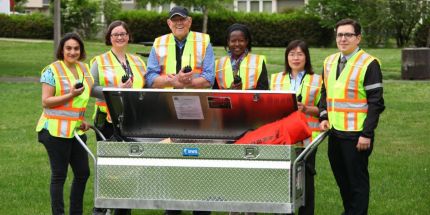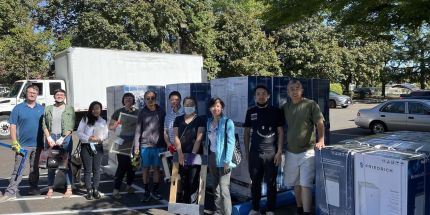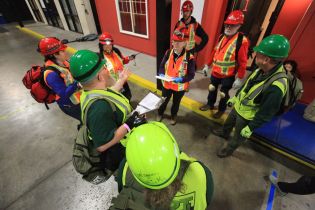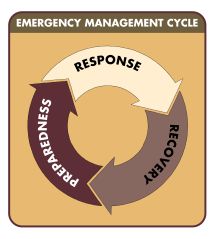PBEM Community Resilience Flagship Programs: Difference between revisions
GlennDevitt (talk | contribs) CRT > CPT |
|||
| Line 1: | Line 1: | ||
The Community | The Community Preparedness Team (CPT) is a division of the Portland Bureau of Emergency Management (PBEM). CRT manages many programs and projects, but this page is to provide a brief description of the CRT "Flagship" programs. | ||
__TOC__ | __TOC__ | ||
Latest revision as of 17:17, 17 December 2024
The Community Preparedness Team (CPT) is a division of the Portland Bureau of Emergency Management (PBEM). CRT manages many programs and projects, but this page is to provide a brief description of the CRT "Flagship" programs.
.
Portland Neighborhood Emergency Teams (Portland NET)
The Portland NET program is modeled from the Federal Emergency Management Agency (FEMA) Community Emergency Response Team (CERT) program. The CERT program began in 1985 in Los Angeles, and was itself modeled from a similar program the Los Angeles Fire Department observed in Tokyo, Japan.[1] Los Angeles Fire became interested in citizen response programs following the 1985 Mexico City Earthquake, where untrained citizens rescued around 800 people but nearly 100 people of those citizens lost their lives in rescue attempts.[2] FEMA adopted and standardized the Los Angeles CERT program in 1993. In 1994, Rachael Jacky with Portland Fire and Rescue (PF&R) adapted the national CERT curriculum for Portland and incorporated it with existing emergency response volunteer teams. In order to avoid confusing the CERT program with the Portland Police Bureau’s Special Emergency Reaction Team (SERT), the program was renamed the Portland Neighborhood Emergency Team program (NET). Many volunteer emergency response programs in the Portland region (such as Tigard and Beaverton) have retained the CERT title.
Portland NET's main city website is located at: https://www.portland.gov/pbem/neighborhood-emergency-teams.
.
What do NETs do?
In the event of a citywide or regional emergency such as a severe winter storm, flood or major earthquake, households need to be prepared to be on their own for at least two weeks or even longer. Neighborhoods need to be prepared for self-sufficiency, too. Volunteer neighborhood rescuers will likely be first on the scene when firefighters and police are slowed by impassable streets or overwhelmed by calls for help. NET Members live or work in Portland and receive instruction from PBEM and PF&R to provide emergency disaster assistance within their own neighborhoods. NET Members are prepared to save lives and property until police, fire, and EMS responders can arrive. These volunteers are specially trained to help others without putting themselves in harm’s way. NET Members are:
- Prepared to be self-sufficient for two weeks during any emergency.
- Able to provide emergency assistance to their family and immediate neighbors.
- Able to work within an emergency response team and with professional emergency responders to save lives and property in their neighborhood.
- Able to guide untrained volunteers who want to help others during a disaster.
.
How is Portland NET different from CERT?
All CERTs are managed at the local level and, therefore, all CERTs are shaped by their local communities and often have slightly different rules and practices from each other. Portland NET differs not only in name, but in several key ways as well that CERTs integrating with Portland NET should know about:
- Portland NET uses different branding and a different palette than CERT programs. Almost all CERT programs have like branding and are distinguished with lime green helmets and vests. Portland NET uses red-orange. For more information on NET branding and colors, please see the article on Program Design Elements. Unfortunately, this also means finding NET branded equipment much more difficult than finding CERT branded equipment.
- Basic NET Training expands on Basic CERT Training. A typical Basic CERT class runs 20 to 25 hours. NET basic training runs 27 to 30 hours. The reason is that NET Basic includes the whole Basic CERT textbook, but also adds on a course in radio communications and a course in community outreach. The Basic CERT curriculum on "Team Organization" is also significantly changed for Portland NET.
- NET organization and training reflects Portland response needs for the aftermath of a Cascadia Subduction Zone earthquake. Most CERTs are comprised of a single team covering a single service area. PBEM organizes NETs into many neighborhood-scale teams and each are responsible for their own Operations Plan. NET advanced training courses also reflect post-CSZ earthquake needs: wilderness first aid, emergency animal sheltering, mental health first aid, and so on.
- NET is exceptionally well resourced compared to most CERTs. The City of Portland has made a major investment in the NET program, dedicating three staff members to program management and an average of $150k in general fund dollars for expenses. Some community resilience programming in Portland, including NET, is also funded through Urban Area Security Initiative (UASI) grants. As a result of these inputs, Portland NET includes over 2,000 volunteers contributing an average of 30,000 hours annually.
.
Basic Earthquake Emergency Communications Nodes (BEECN)

Portland's BEECN system, which stands for Basic Earthquake Emergency Communication Node, serves a critical purpose in the event of a major earthquake or disaster. The BEECN system is designed to establish communication hubs throughout the city where residents can seek assistance, information, and support during emergencies when traditional communication channels may be disrupted. These BEECN sites are strategically located in neighborhood parks, schools, and other accessible areas to provide a safe meeting point for individuals and families affected by a disaster. The primary objective of the BEECN system is to connect residents with trained volunteers who can offer essential services, such as first aid, information on local resources, and communication support to reach loved ones. By providing these essential services and a central point of contact, the BEECN system aims to enhance community resilience, promote effective communication, and ensure that individuals receive the assistance they need in the aftermath of a significant earthquake or disaster in Portland.
PBEM spun up BEECN in December 2012. The official BEECN website is: https://www.portland.gov/pbem/about-beecn
.
Community Organizations Active in Disaster (PDX COAD)

COADs, which stands for Community Organizations Active in Disasters, are groups formed to enhance community resilience and response during times of emergencies or disasters. A national model that brings together community organizations under four principles: Communication, Cooperation, Coordination and Collaboration. Each organization acts independently and retains full autonomy and authority in how they serve their communities.
Nationally, COADs bring together various local organizations, such as nonprofits, faith-based groups, and community service organizations, to collaborate and coordinate their efforts in disaster preparedness, response, and recovery. These organizations play a crucial role in disaster management by providing support services, resources, and expertise to assist individuals and communities in need. COADs aim to ensure that community members receive timely and effective assistance during emergencies, promote information sharing and communication, and foster partnerships among different organizations to maximize their collective impact in times of crisis. By working together, COADs strive to strengthen community resilience and facilitate a more coordinated and comprehensive response to disasters.
The City of Portland began its own COAD late in 2018. PDX COAD is a network of community organizations that prepare for and respond to emergencies and disasters like heatwaves, winter weather and earthquakes. COAD partners are trusted sources of information for their communities and provide lifeline services every day. As Portland experiences intensifying heat, winter weather and wildfire smoke events, they have become climate first responders.
The City of Portland's web presence for PDX COAD is at: https://www.portland.gov/pbem/coad.
.
Notes and References
- ↑ Community Emergency Response Team (CERT). (n.d.). FEMA.gov. https://www.fema.gov/emergency-managers/individuals-communities/preparedness-activities-webinars/community-emergency-response-team#:~:text=History%20of%20CERT,to%20meet%20their%20immediate%20needs.
- ↑ Whittaker, J., McLennan, B., & Handmer, J. (2015). A review of informal volunteerism in emergencies and disasters: Definition, opportunities and challenges. International Journal of Disaster Risk Reduction, 13, 358–368. https://doi.org/10.1016/j.ijdrr.2015.07.010

